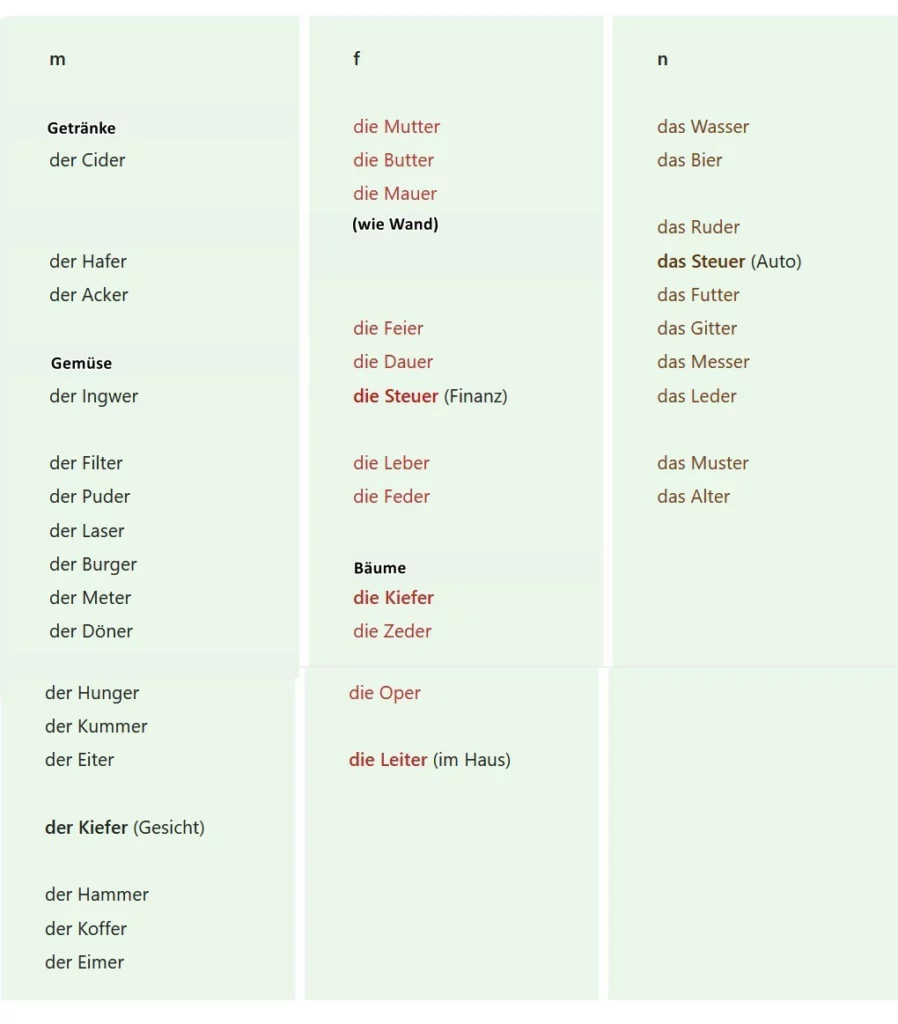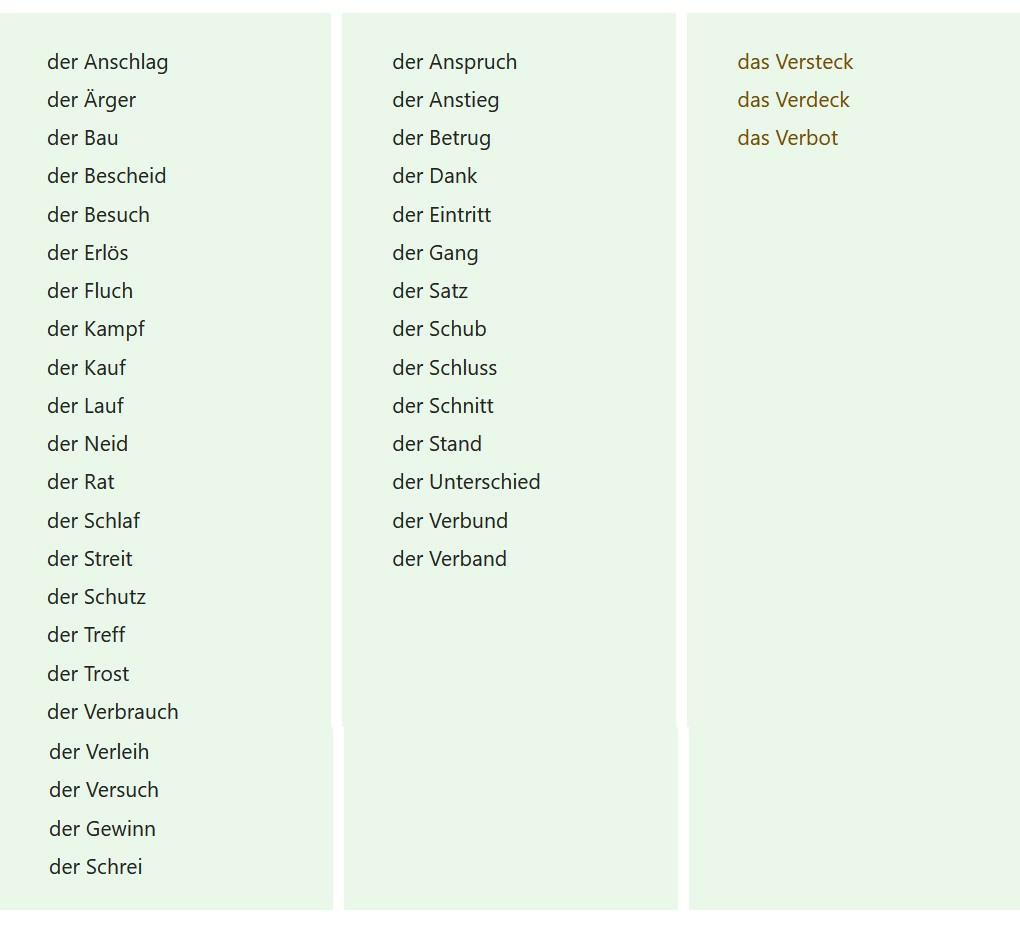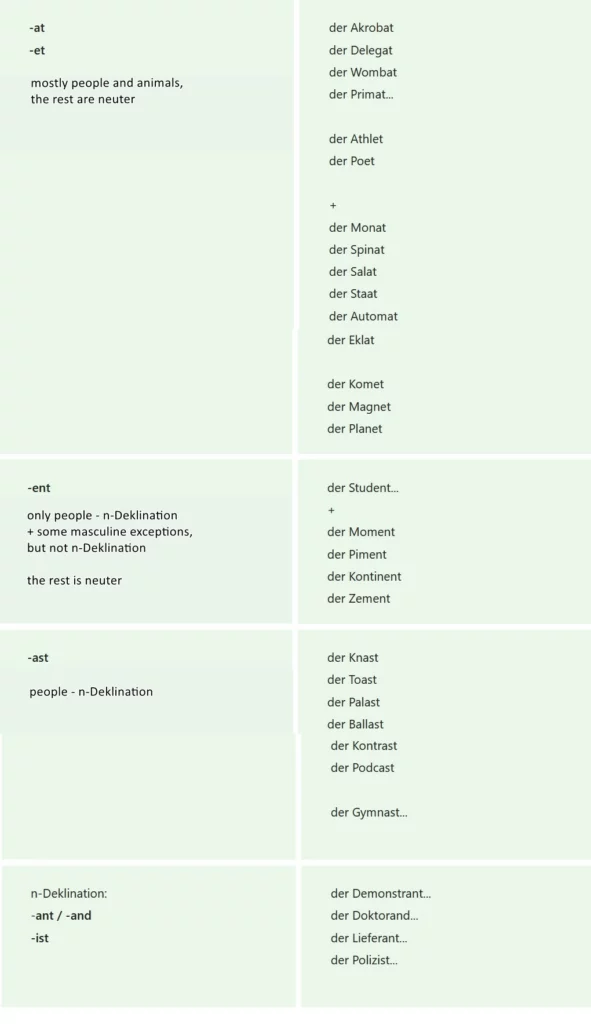Last Updated on October 2, 2024
Let’s continue studying plural, declension and gender in German. In this part, the masculine gender in singular and plural and n-Deklination.
1. Plural, declension, and gender in German. Feminine gender
3. Plural, declension, and gender in German. Neuter gender
Tests for Gender and Plural in German
Sentences with zu in German
Verbs with prepositions in German. Preposition um and preposition über
Modal verbs in German
Past tense in German. Perfect and preterite
Separable verbs in German
SS or ß in German
From horror to anxiety: fürchten, Angst haben, erschrecken, bangen, entsetzen
Reach an agreement: vereinbaren vs verabreden, ausmachen etc.
Fahrstuhl or Aufzug or Lift and others
Masculine gender in German
Masculine gender by meaning
If we look closely at the exceptions, we will find a picture opposite to the feminine gender: the exceptions in the meaning groups most often include words ending in -e, which are expectedly feminine, and other words with typically feminine endings (for example, in -cht).
Nature
In this case, you need to learn the exceptions of the neuter gender, since they cannot be classified. The exceptions of the feminine gender correspond to the scheme.

Time and periods
Almost all are masculine, except for generalizing words and small units of time. First, let’s look at words that have a different gender and do not belong to the following groups by meaning:
das Jahr
die Jahreszeit
die Woche
die Sekunde
die Minute
die Stunde

Alcohol and other drinks
All alcoholic drinks are masculine except beer. Apparently beer is not considered alcoholic, practically water for German.
der Wein
der Schnaps
der Wodka
der Rum
der Tequila
der Likör
der Sake
der Cider…
Let’s add non-alcoholic beverages to the mix:
der Tee
der Kaffee
der Sprudel
der Saft
The following do not belong to the masculine gender:
das Bier
das Wasser
das Cola
die Schorle
die Limonade
Cereals
Almost all cereals are masculine, except die Hirse, die Gerste.
der Weizen
der Mais
der Reis
der Roggen
der Dinkel
der Hafer
der Bulgur
Money and cars
Rarely used with an article, however, most often masculine – names of currencies and cars.
der Yen
der Dollar
der Euro
There are few exceptions to this rule, but more from historical money.
die Rupie
die Krone
die Mark
das Pfund
die Lira
die Kuna
die Guinee
die Peseta
If you can’t see the image, turn on ads and cookies.
Words of masculine gender by form
The masculine gender also includes the words of n-Deklination, which are listed below.
If you don’t see the image, turn on ads and cookies.
Gender designations
All males ending in -er (-ler, -ner) / -or are masculine.
der Erfinder
der Fahrer
der Lehrer
der Investor
der Organisator
der Lektor
der Author
der Doktor
der Rektor
der Bachelor
And also loanwords ending in -ier and –eur, denoting people:
der Bankier
der Hotelier
der Finanzier
der Friseur
der Billeteur
der Requisiteur
Words ending in -ier that do not denote people are usually of the neuter gender.
The suffix -eur has a feminine counterpart -euse, but it is rarely used, preferring to add -in (Friseurin instead of Friseuse).
Words, ending in -ling, -ig, -ich
All of these groups are masculine without exception, but don’t confuse them with similar words. For example, Reich doesn’t fit into the -ich group (you can’t separate the e from the i), and Recycling doesn’t fit into the -ling group (l refers to the root, the word is English and fits into the group of similar words ending in -ing, neuter).
der Schmetterling – thought to come from Schmetten (an old word for sour cream), so it’s the little thing that hangs around dairy products (similar to butterfly).

Words, ending in -er
As already mentioned, -er denotes the male persons. However, other words ending in -er are also more often masculine. Although there are quite a few exceptions.
Actor or instrument
The main group of the masculine gender are words formed from verbs and denoting
– the one who performs this action,
– instrument
– object of action.
der Drucker
der Kleber
der Löser
der Ordner
der Wasserkocher
der Füller
der Bagger
Animals and birds
Another stable group: animals and birds ending in -er will be masculine:
der Adler
der Biber
der Tiger
der Nager
der Eber
Other words, ending in -er
Some of the words we have already come across in previous groups, which will help us remember them, but the rest just need to be learned by heart.
Note that there are several pairs of identical-looking words of different genders.

Words, ending in -el
Words ending in -el are also mostly masculine.
Here we have two stable groups.
Masculine words formed from verbs
This is a large group of words denoting what is used to perform an action, a tool. The meaning may no longer be traceable, and sometimes the word received a suffix by analogy.
der Hebel
der Deckel
der Pickel (Instrument)
der Dübel
der Bügel (Griff, biegen)
der Zügel (ziehen)
der Flügel
der Gürtel
der Kessel
der Würfel
der Spiegel
der Löffel
der Schlüssel
der Stempel
der Wirbel
der Zettel
der Meißel
If you remember, we had two exceptions in flowers (feminine) – der Lavendel and der Hartriegel (dogwood). The first can be related to this group: lavender was used for washing (the Latin root “to wash” is the basis).
Words formed from nouns with a diminutive meaning
In this group, exceptions of the neuter gender are possible.

Other words, ending in -el
Some are already familiar to us as exceptions.

Words, ending in -en
Words ending in -en that are not substantivized verbs (i.e. not words like das Essen) are overwhelmingly masculine. I found two exceptions: das Kissen and das Laken.
der Ofen
der Kuchen
der Besen
der Boden
der Bogen
der Busen
der Faden
der Hafen
der Haken
der Laden
der Karpfen
der Kasten
der Graben
der Garten
der Balken
der Wagen
der Magen
der Rasen
der Zapfen
der Tropfen
der Rücken
der Reifen
der Roggen
der Kragen
Nouns from verbs without a suffix
Most words formed from a verb by truncating the ending -en will be masculine. This also applies to those nouns that have a changed vowel at the root.
Exceptions are rather very random or are not exceptions at all. For example, die Arbeit is not from a verb at all, but the verb is from it. das Leid is not from leiden, but from an adjective.

Loanwords


Masculine declensions
The strong declension, to which most masculine words belong, has the ending -(e)s in the genitive singular.
Words ending in -e, -er, -el or zero in the plural also add the ending -(e)n in the dative plural.
Words ending in -s in the plural do not add this ending.
Gen Singular
Hund(e)s
Bürgers
Tellers
Clowns
Dat Plural
Hunden
Bürgern
Tellern
Clowns
n-Deklination
One group of masculine words belongs to a special declension – n-Deklination.
These words retain their initial form only in the nominative singular. In all other cases in the singular and plural they have the ending -en (sometimes -n).
However, the ending -en is dropped when these words are used in the singular:
– after the preposition without articles
– often in everyday speech.
The following words are related to n-Deklination.
People and animals, ending in -е
der Affe
der Löwe
der Hase
der Rabe
der Welpe
der Bulle
der Drache…
der Bube
der Erbe
der Junge
der Neffe
der Pate
der Nachkomme
der Experte
der Kollege
der Kunde
der Zeuge
der Postbote
der Laie
der Genosse
der Jude…
der Riese
der Sklave
Nationalities
This concerns about 40 nationalities, mainly Scandinavian, Slavic, some Central Asian republics and parts of Great Britain.
Pole
Serbe
Tscheche…
Franzose
Däne
Finne
Este
Schwede
San-Marinese
Grieche
Ire
Brite
Schotte
Monegasse
Kasache…
Türke
Afgane
Chinese…
However, Deutsche is declined as a substantivized adjective.
Feminine pairs of the indicated nationalities with the suffix -in are declined as feminine nouns.
Loanwords
with suffix -ant
Mostly people, but not only.
Masculine exceptions not related to n-Dekl: der Leutnant, der Proviant.
The remaining words belong to the neuter gender and, accordingly, do not relate to n-Denklination (das Deodorant, das Restaurant, das Quant).
der Adressant
der Aspirant
der Debütant
der Doktorant
der Demonstrant
der Dilettant
der Emigrant
der Fabrikant
der Informant
der Laborant
der Lieferant
der Praktikant
der Protestant
der Simulant
der Spekulant
der Gigant
der Mutant
der Pedant
der Elefant
der Konsonant
der Hydrant
der Diamant
der Foliant
with suffix -and
der Diplomand
der Doktorand
der Magistrand
der Konfirmand
with suffix -ent (only people)
der Abonnent
der Agent
der Assistent
der Dirigent
der Dozent
der Konkurrent
der Korrespondent
der Präsident
der Produzent
der Referent
der Student
der Dissident
der Patient
der Exponent (the one who represents and mathematical)
ending in -ast (only people)
der Enthusiast
der Gymnasiast
der Phantast
der Sarkast
der Gymnast
ending in -ist (people)
der Journalist
der Polizist
der Tourist
der Egoist
der Terrorist
der Altruist
der Faschist
der Extremist
der Realist
der Sozialist
der Bassist
der Bundesligist
der Karikaturist…
ending in -at / -et (mostly people)
der Bürokrat
der Diplomat
der Soldat
der Athlet
der Kandidat
der Magnat
der Pirat
der Expat…
+
der Planet
der Komet
der Magnet
der Automat
der Primat
Words from Greek, denoting mainly professions (but not only)
der Biologe
der Fotograf, der Telegraf (…graf, …grapf)
der Architekt
der Chirurg (…urg)
der Pädagoge
+
der Satellit
der Katolik
Words without formal attributes denoting people or some animals
der Bär
der Bauer
der Christ
der Graf
der Fürst
der Graf
der Held
der Herr (des Herrn, die Herren)
der Kamerad
der Mensch
der Nachbar
der Prinz
der Vetter
Mixed declension
Several words belong to the mixed declension. This declension not only has the ending -en in all forms except the nominative singular, but also -s in the genitive singular (des Namens).
The mixed declension includes:
der Gedanke
der Name
der Friede
der Wille
der Funke
+
das Herz
Plural masculine
The main variants for the masculine gender are the ending -e and the zero ending. The remaining endings apply to a limited number of words.
If you don’t see the image, turn on ads and cookies.


1. Plural, declension, and gender in German. Feminine gender
3. Plural, declension, and gender in German. Neuter gender
Tests for Gender and Plural in German
Sentences with zu in German
Verbs with prepositions in German. Preposition um and preposition über
Modal verbs in German
Past tense in German. Perfect and preterite
Separable verbs in German
SS or ß in German
From horror to anxiety: fürchten, Angst haben, erschrecken, bangen, entsetzen
Reach an agreement: vereinbaren vs verabreden, ausmachen etc.
Fahrstuhl or Aufzug or Lift and others
Do you enjoy the site without cookies and maybe without ads? This means that I work for you at my own expense.
Perhaps you would like to support my work here.
Or Cookie settings change: round sign bottom left

